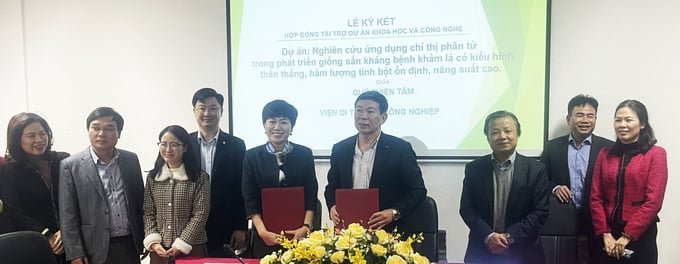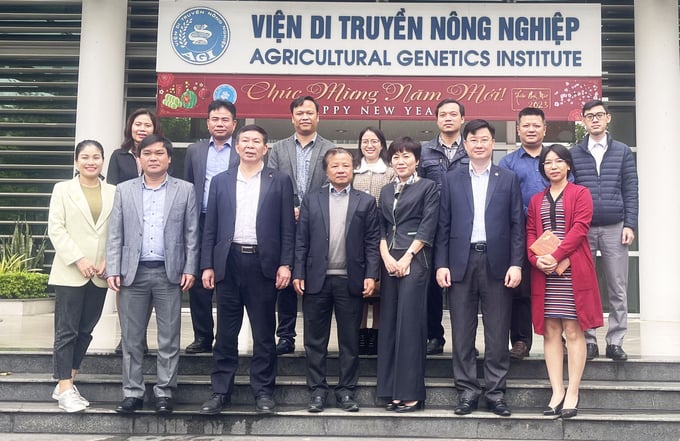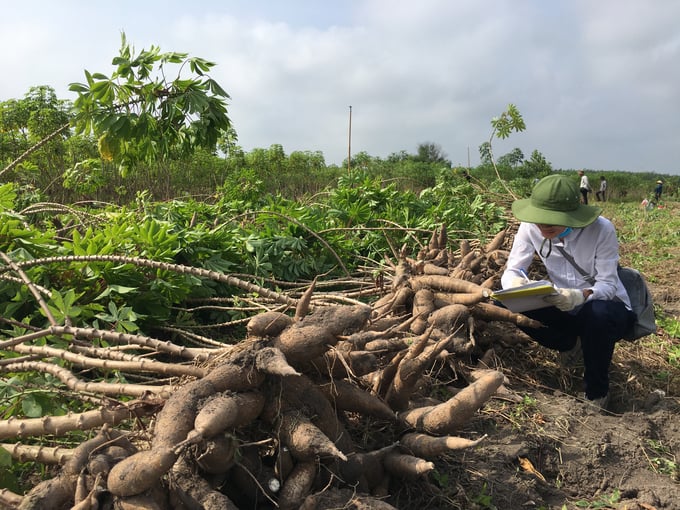Recently, Institute of Agricultural Genetics (Ministry of Agriculture and Rural Development) and Thien Tam Foundation (Vingroup) signed a grant agreement for the project “Research and application of molecular markers in the development of cassava varieties resistant to leaf mosaic disease Body shape, more stable starch content, high yield”.

Heads of the Institute of Agricultural Genetics and the Thien Tam Foundation signed a project sponsorship agreement. Picture: shark app
The project has a term of 5 years starting in January 2023 and is expected to end in December 2027 with financing from the Thien Tam Fund of VND 15 billion. In addition, the project has more reciprocity from the Bioversity Alliance; International Center for Tropical Agriculture (CIAT) and People’s Mutual Capital.
The objectives of the project include: selecting and producing at least 03 cassava cultivars resistant to leaf mosaic disease with high yield and vigour, suitable for 4 popular organic cassava growing regions in the country; Construction of a set of molecular markers related to starch content in cassava; to develop a set of molecular markers related to upright plant design, adapted to the high-density cultivation methods of Vietnamese farmers.
according to dr Le Huy Ham (Institute of Agricultural Genetics), the cassava production industry in our country is currently under great pressure due to leaf mosaic disease. Accordingly, research and production of cassava varieties resistant to leaf mosaic disease with high yield and strength are urgently needed.

Heads of Institute of Agricultural Genetics and Thien Tam Foundation took a commemorative photo at the project sponsorship signing ceremony. Picture: shark app
Over the years, scientists from the Institute of Agricultural Genetics have coordinated with the Alliance of Bioversity – CIAT and national and international entities to conduct research and select many cassava varieties resistant to leaf mosaic disease. As a result, 6 self-published varieties of cassava were circulating in the southeastern region, namely varieties HN1, HN3, HN5, HN36, HN80 and HN97.
However, these are cassava varieties that come from Africa and are intended for fresh consumption, starch content varies greatly depending on the type of cultivation and ecological region, a lot of branching and no adaptability, with many different ecological regions in Vietnam.
According to Le Huy Ham, in addition to government funds, sources of funding from units, organizations and companies are of great importance and importance to support and serve the research work in a timely manner. Therefore, the Thien Tam Fund of Vingroup and its international partners to promote this project represents a very important and timely resource for scientists of the Institute of Agricultural Genetics. Coordination with agencies and research units to obtain disease-resistant, high-yielding and good quality cassava varieties for the production in the coming period.

The funding will be a large and timely resource to support research into cassava cultivars that are resistant to leaf mosaic disease and have high yield and starch quality for production. Picture: tsp.
Prof. Dr also carries out research and development projects for many other crops and thus contributes to improving the livelihoods of Vietnamese farmers.
According to Ms. Phan Thu Huong, Executive Vice President of the Thien Tam Fund, with the mission “For a better life for all”, the Thien Tam Fund wishes that the results of the project contribute to the improvement of livelihoods. The Thien Tam Foundation also ensures close cooperation with the Institute of Agricultural Genetics during the project implementation to ensure the success of the project.

